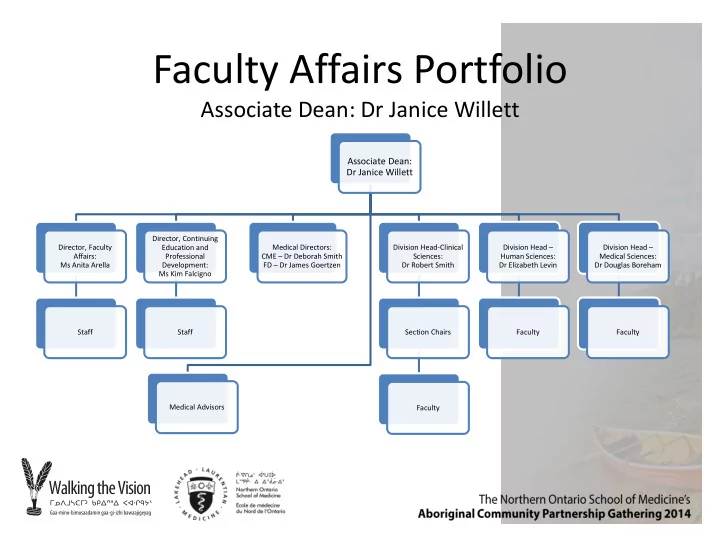

Faculty Affairs Portfolio Associate Dean: Dr Janice Willett Associate Dean: Dr Janice Willett Director, Continuing Director, Faculty Education and Medical Directors: Division Head-Clinical Division Head – Division Head – Affairs: Professional CME – Dr Deborah Smith Sciences: Human Sciences: Medical Sciences: Ms Anita Arella Development: FD – Dr James Goertzen Dr Robert Smith Dr Elizabeth Levin Dr Douglas Boreham Ms Kim Falcigno Staff Staff Section Chairs Faculty Faculty Medical Advisors Faculty
Faculty Affairs Unit (FA) Is responsible for the recruitment, appointment, reappointment, evaluation, promotion, remuneration and overall support of Faculty members and works with other Portfolios to establish, implement, coordinate and streamline faculty centred business practices.
Faculty Affairs Unit Comprised of the three sciences - Clinical, Medical, and Human - that form the basis of the curriculum delivered at NOSM.
Faculty Affairs Unit Clinical Sciences Over 1200 health-care professionals with section-specific clinical expertise • • Anesthesia Internal Medicine • • Child and Adolescent Health Orthopaedic Surgery • • Emergency Medicine Psychiatry • • Family Medicine Surgery • • Health Sciences Women’s Health
Faculty Affairs Unit Medical Sciences 47 Faculty discipline experts for teaching and research in the basic medical sciences, grouped into three sections of disciplines : • Anatomy, Physiology, and Pharmacology • Biochemistry, Cell Biology, and Molecular Biology • Microbiology, Immunology, Genetics, and Haematology
Faculty Affairs Unit Human Sciences 64 Faculty are experts in their disciplines, participate in lecturing, act as facilitators of small group sessions in the undergraduate medical curriculum, are available to supervise graduate students, and provide opportunities for applied community research placements in various locations and communities.
Continuing Education & Professional Development Unit (CEPD) Dedicated to the provision of innovative, learning centered continuing medical education (CME), faculty development (FD), and continuing professional development opportunities. CEPD educational programming promotes lifelong learning and enhances clinical and teaching competencies and overall performance of health care professionals and faculty, while advancing their ability to meet the needs of the people of Northern Ontario.
Accrediting Body The Committee on Accreditation of Continuing Medical Education (CACME) accredits the Continuing Medical Education/Continuing Professional Development (CME/CPD) offices of all Canadian faculties of medicine.
Continuing Medical Education (CME) CEPD Office works closely with internal and external groups to develop needs based and learner centered CME opportunities relevant to the clinical area of practice. These opportunities are extended to other health professionals working in the respective specialty area.
Faculty Development (FD) CEPD works collaboratively with all Undergraduate, Post-Graduate and Community Engagement programs to develop the NOSM Faculty Development Program Annual program evaluation drives change and improvement to Program
Faculty Self-Identification • Annual faculty questionnaire offers an opportunity for faculty with Aboriginal ancestry to self- identify • 26 have chosen to self-identify so far, though we believe there are more not yet identified
CME & FD Events • High quality learning opportunities that are needs-based, evidence-based, and free of bias • Multiple ways of attending events (ie., Face to Face, Videoconference, Ontario Telemedicine Network, Webcast, Teleconference) • Opportunities to learning in a variety of ways (ie., Lecture, Simulation, One-on-One, Small group, Self-Directed via online learning options such as Moodle) • Certificates of Attendance for each event attended AND a cumulative transcript of all CEPD activities have participated in, available 24 hours/day from website.
Aboriginal Peoples’ Health Program Planning Committee Responsible for developing, implementing and evaluating continuing education programs that address Community Engagement needs, promoting Rural and Remote practice, Francophone Health and Culture, and Aboriginal Peoples’ Health into all programs. Educational opportunities are aimed at increasing social accountability relating to these areas.
2011 Events Jan 2011 – Indigenous Aspects of Cultural Safety Education Nov 2011 – Addressing Colonialism: Understanding the Foundation of Cultural Safety
2012 Events Feb 2012 – Understanding Cultural Contexts in Providing Culturally Safe Care in Health Settings June 2012 – Film Series: The Life You Want: A Young Woman’s Struggle with Addiction
2012 Events Sept 2012 – Improving Health Outcomes for Aboriginal Peoples: How Can Health Care Professionals Contribute? Sept 2012 – Plant Medicine, Traditional Healing and Role of the Modern Health Care Practitioner Workshop
2012 Events Rendezvous Conference: • Conference on The Move • Plenary (incl. Aboriginal NOSM graduate) • Local Community Visits (i.e., Aboriginal Teaching Lodge, Legal Clinic, Health Clinic)
2013 – Needs Assessments • Health Sciences Program Planning Committee needs assessment revealed requests for programming on Aboriginal health and healing, First Nations medicine topics • Northern Constellations faculty development conference evaluations identified cultural competency/safety future topics
2013 Events Mar 2013 – Cultural and Linguistic Competence in Health Care Workshop Mar 2013 – Sioux Lookout Physicians Conference Oct 2013 – Integrating Aboriginal Health and Culture as a Practitioner and Preceptor Workshop
2014 Events Jan 2014 – Sioux Lookout Region Physician Service Retreat Mar 2014 – My Patient/Client Speaks French, and I Don’t Jun 2014 – Northern Health Research Conference (held in Sioux Lookout) Forthcoming: Sioux Lookout Rounds, Academic Days
Medical Partnerships • Thunder Bay Regional Health Sciences Centre’s Medical Education Committee • Health Sciences North Sudbury Continuing Education Committee
Aboriginal Reference Group (ARG) • Reports directly to the Dean • Seat on Academic Council • Seat on Joint VP and Dean’s Group • Serve as interviewers for undergraduate student admissions interviews
Focus Group Questions 1. In your opinion, what strategies or supports could NOSM use to encourage all faculty members of Aboriginal ancestry to self-identify or disclose this information to the Faculty Affairs Unit for reporting purposes?
Focus Group Questions 2. In your opinion, how can NOSM succeed at improving the representation of perspectives and needs of Aboriginal communities in the needs assessment phases of provincially organized educational projects (i.e., the IDEAS Introductory Quality Improvement Program) and NOSM developed CME/FD events?
Thank you! Faculty Affairs &
Recommend
More recommend